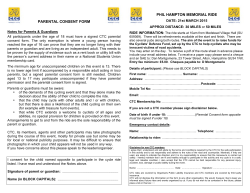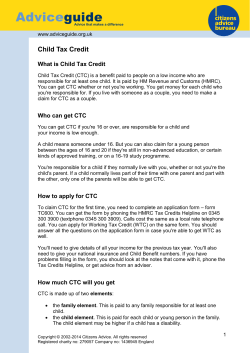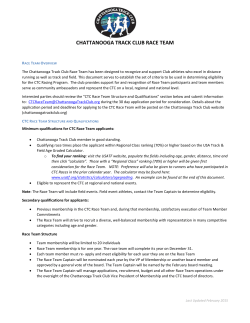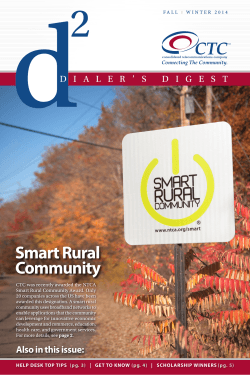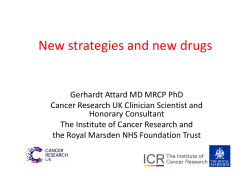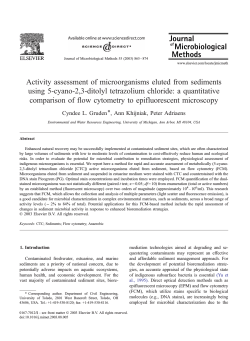
Fact Sheet - Cheltenham Communities that Care
What is Communities That Care? Communities That Care (CTC) is a risk-focused approach to reducing adolescent problem behaviors through community mobilization and planning. Local citizens and community leaders work together as the CTC Board to identify the risk factors that increase the likelihood of problem behaviors developing, and enhance the protective factors that can shield youngsters from problems. The risk and protective factors are used to implement a comprehensive plan to step ahead of problems with far-reaching and long-lasting solutions. The CTC Community Vision Cheltenham CTC strives to create a healthy community for youth and families through opportunities and collaboration that decreases risk factors for problem behaviors and promotes positive youth development, academic achievement, healthy decision-making, and strong family bonds. What are Risk Factors? Risk factors such as availability of drugs, family conflict, academic failure, and favorable attitudes toward problem behavior are those conditions that increase the likelihood that a child will develop one or more behavior problems in adolescence. CTC attempts to identify and reduce the risks present in the community, home and school. What are Protective Factors? Protective factors, such as individual characteristics, bonding, healthy beliefs and clear standards, are aspects of adolescent’s lives that counter risk factors or provide a buffer against them. A key strategy of CTC is to enhance protective factors that promote positive behavior, well-being and personal success. What Risk Factors has CTC Identified for Youth in the Cheltenham Area? The Cheltenham CTC Prevention Board has identified four priority risk factors that can lead youth in the Cheltenham/West Oak Lane area to engage in problem behaviors: 1. Family Management Families experiencing stress such as conflict, parenting problems, and poor communication skills have a more challenging time working through the pre-adolescent and adolescent stages without tremendous turmoil or negative outcomes. Poor family management practices include lack of clear expectations of behavior, failure of parents to monitor their children, and excessively severe or inconsistent punishment. These practices place youth at higher risk for substance use, delinquency and other problem behaviors. 2. Depressive Symptoms Young people who are depressed are overrepresented in the criminal justice system and are more likely to use drugs and become involved in problem behavior. 3. Availability of Drugs The more available drugs are in a community, the higher the risk of young people abusing drugs in that community. 4. Perceived Risk of Drug Use The perception of harm from drug use is related to both experimentation and regular use. The less harm an adolescent perceives as the result of drug use, the more likely it is that he or she will use drugs. How is CTC Responding to These Risk Factors? Cheltenham CTC provides prevention education through forums, presentations, community outreach, summer recreation calendars, and informational mailings. In addition, the CTC Prevention Board is undertaking a series of programmatic strategies to assist schools and families in helping youth to avoid problematic behavior: Guiding Good Choices – A five-week curriculum designed to assist parents in preparing their children to make positive decisions and identifying the early warning signs of substance use. Targeted Drug Patrols – Police details targeting drug activity in areas youth frequent to obtain and/or use illicit drugs. Underage Drinking Enforcement – Enforcement of underage drinking laws as well as investigative time on hosts, suppliers, or purchasers of alcohol for underage youth through Source Investigations and Shoulder Tap Enforcement. Responsible Alcohol Management Program (RAMP) – RAMP teaches alcohol-serving establishments how to identify underage individuals and prevent dangerous drinking. Sticker Shock – A tested technique to raise community awareness of the penalties and problems associated with purchasing or providing alcohol for anyone under 21 years of age. Social Marketing – Campaigns such as Find Your 25th Hour are intended to increase public awareness to pressing community issues. What Can You Do? Some of the things that you can do to make a difference in the lives of Cheltenham’s youth include: Share in the decision-making by joining the CTC Board Lend your expertise (program development, graphic design, community knowledge, marketing/PR) Spread the word about CTC to friends, family and your neighbors Donate your services to support youth-focused organizations, agencies or programs. For More Information Contact: Angela Bell, Esq. Community Mobilizer Cheltenham Communities That Care 610-630-2111 ext. 236 abell@fsmontco.org www.CheltenhamCommunitiesThatCare.org 1/2015
© Copyright 2025
